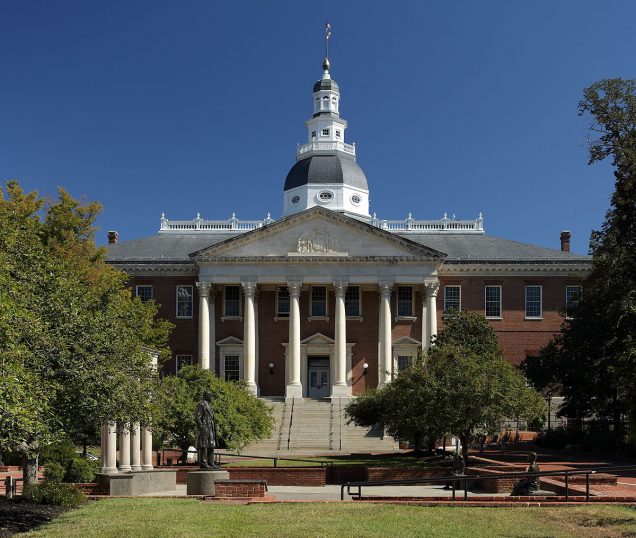Tagged: Permanent Internet Tax Freedom Act
Making Big Tech Pay Their Share: The Taxation of Digital Advertising in Maryland
In sharp contrast to the bevy of tax incentives offered to Amazon as part of a bid for the so-called “HQ2,” Maryland has charted a path towards taxation of technology companies as part of its commitment and obligation to its residents. This move to hold large companies accountable for the money they derive from Maryland residents is laudable, given the amount of data mined from individuals and used to sell targeted digital advertising as well as the crisis of state budget shortages. However, as written, Maryland’s efforts raise serious legal concerns that jeopardize the viability of the current iteration of the bill. The bill draws on an existing model to achieve important social goals. However, in the context of the American legal framework, the current iteration of the bill raises First Amendment freedom of speech concerns and faces further challenges under the commerce clause and federal legislation enacted to promote and facilitate Internet commerce. These shortcomings need not be fatal, though. With modest redrafting, the policy underlying the bill could be implemented in order to fulfill Maryland’s goals.
The bill
Introduced in the Senate as Senate Bill 2 and in the House as House Bill 695, parallel bills in the Maryland legislature impose a
tax on gross revenues derived from digital advertising. The amount ranges from 2.5% for a corporation with annual gross revenues from $100 million to $1 billion up to 10% for those with gross revenues over $15 billion. The revenue raised will go to the Blueprint for Maryland’s Future Fund, which funds K-12 education improvements in the state. This policy, though lauded as the first attempt to tax digital advertising revenues in the United States, is not without global precedent. Rather, it is modeled after a French law, which levies a 3% tax on digital interface and “targeted advertising services” in France. The tax only applies to companies with global revenues from digital interface and targeted advertising of more than €750 million globally, with at least €25 million of which was derived from French users. France enacted this legislation July 11, 2019, and was quickly rebuked by the American business community. In particular, President Trump threatened countermeasures of tariffs up to 100% on $2.4 billion worth of French imports to the United States, including sparkling wine and cheese. As a result, France and the U.S. negotiated a pause on the enactment of the law on the condition that the threatened tariffs not go into place.
Like its French model, Maryland’s bill specifically targets large technology companies. The Fiscal and Policy Note for the Maryland bill calls out by name Alphabet (the parent company of Google), Facebook, and Amazon. Proponents suggest that this legislation will force tech companies to “pay their fair share” by contributing to local tax bases rather than reaping the benefits while paying only minimal tax obligations. However, the opponents are not without their own ammunition. As part of their strategy to defeat the underlying policy, they raise legal questions regarding the current drafting and scope of the bill.
Legal considerations
Opponents argue that the selective taxation represents a content-based restriction on free speech because it selectively targets some kinds of advertising based on its communicative content. Following the recent Supreme Court case of Reed v. Town of Gilbert, which expanded the category of what is considered a content-based restriction on speech, this kind of selective taxation could be viewed as falling into the category of speech subject to strict scrutiny and therefore unlikely to survive judicial review. Even as an exercise of commercial speech, subject only to intermediate scrutiny under Central Hudson Gas & Electric v. Public Service Commission, such a tax is unlikely to be sustained. Restrictions on commercial speech must be no broader than necessary to directly further a substantial government interest. Under these circumstances, improving K-12 education is likely a substantial government interest, but the program could not be considered narrowly tailored. There are other means of raising the necessary revenue without burdening commercial speech of only large technology companies.
 Maryland’s tax also raises other, non-First Amendment concerns. As written, the bill could be construed as a violation of the commerce clause of the Constitution, because it would create the possibility of double taxation of the same single economic activity if every state were to adopt a similar regime, violating the “internal consistency” test. A final source of legal concern for the policy is the Permanent Internet Tax Freedom Act, or PITFA. PITFA prohibits state taxation of internet access as well as discrimination against online commerce. The taxation of digital advertising, but not traditional forms of advertising, could be seen as a discrimination against online commerce in violation of PITFA.
Maryland’s tax also raises other, non-First Amendment concerns. As written, the bill could be construed as a violation of the commerce clause of the Constitution, because it would create the possibility of double taxation of the same single economic activity if every state were to adopt a similar regime, violating the “internal consistency” test. A final source of legal concern for the policy is the Permanent Internet Tax Freedom Act, or PITFA. PITFA prohibits state taxation of internet access as well as discrimination against online commerce. The taxation of digital advertising, but not traditional forms of advertising, could be seen as a discrimination against online commerce in violation of PITFA.
Looking forward
The French example and advertising industry outcry against the Maryland proposal suggest that taxation of digital advertising will be a difficult prize to win. Significant political, economic, and legal hurdles remain. However, in an era of declining state revenues and K-12 funding crises, novel solutions must be sought. The digital advertising industry, reaping incredible profits, represents a tempting source of revenue for states dealing with these demands. However, as constructed, the policy presents serious legal shortfalls. This is not to say that the taxation of a major economic activity ought to be abandoned as a policy proposal. Rather, the specific construction of the statute needs to be reconsidered as the Maryland legislature moves forward. For example, a modification in the way that “in the state” is determined for the purposes of the tax could eliminate the concern of double taxation and, therefore, the commerce clause concerns. Where modest redrafting could save the policy from its legal challenges, it seems imperative to do so given the high stakes underpinning the policy.
 Jordan Neubauer anticipates graduating from Boston University School of Law in May 2020.
Jordan Neubauer anticipates graduating from Boston University School of Law in May 2020.


